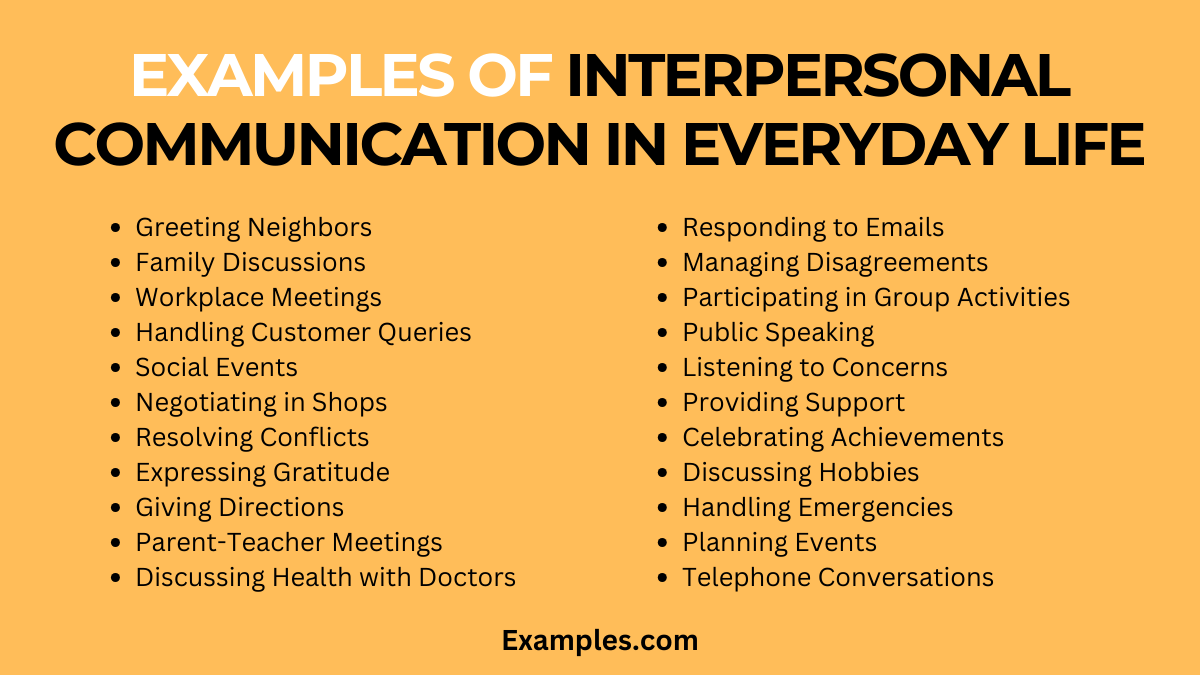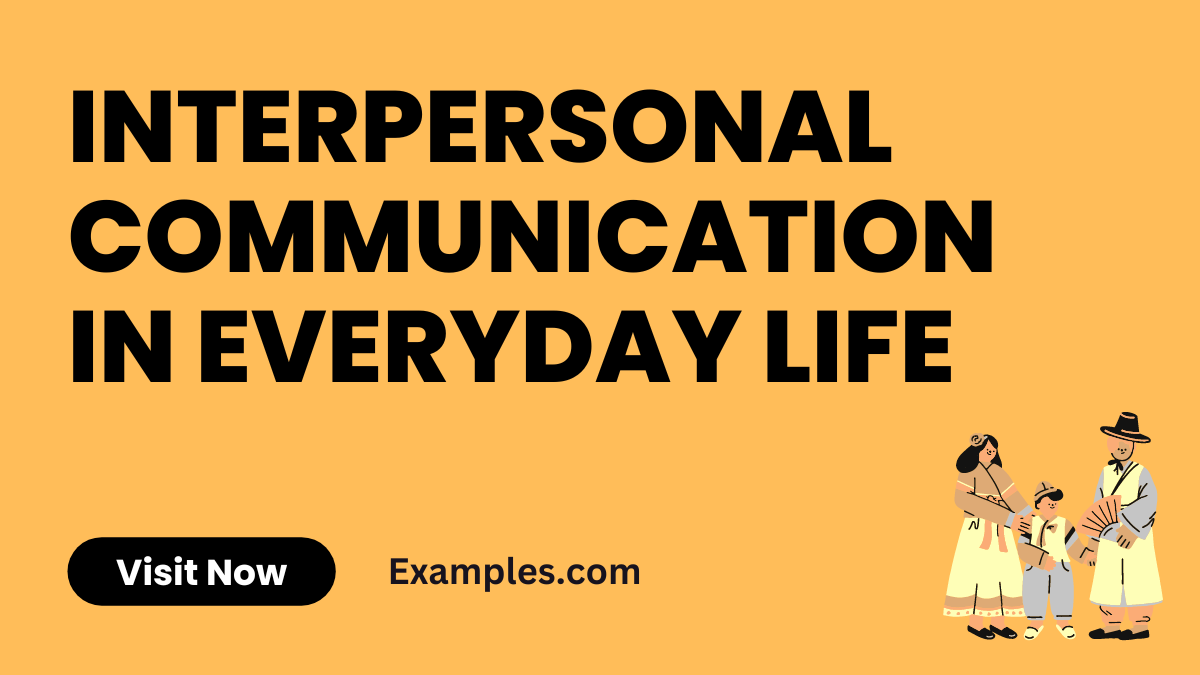29+ Interpersonal Communication in Everyday Life Examples
Dive into the realm of Interpersonal Communication in Everyday Life, a comprehensive guide enriched with practical communication examples. This guide illuminates the art of everyday interactions, revealing how effective communication shapes our relationships, work, and social life. From family conversations to professional exchanges, each section is packed with real-world examples and insights, offering you the tools to navigate the subtleties of daily communication. Enhance your interpersonal skills and transform your everyday interactions into meaningful connections.
30 Examples of Interpersonal Communication in Everyday Life

Interpersonal communication plays a vital role in our daily lives, shaping our interactions and relationships. This guide, enriched with practical communication examples, provides 30 distinct ways to enhance your daily communication. Each point is accompanied by an example, demonstrating how to apply these skills in various everyday situations. Whether it’s a casual conversation with a friend or a critical discussion at work, these tips will help you navigate the nuances of effective interpersonal communication, making every interaction more meaningful and productive.
- Greeting Neighbors: A friendly greeting can create a positive community atmosphere.
Example: “Good morning! Beautiful day, isn’t it?” - Family Discussions: Open communication within the family strengthens bonds.
Example: “Let’s talk about our day at dinner tonight.” - Workplace Meetings: Clear and concise communication is key in meetings.
Example: “Let’s summarize the main points to ensure we’re all aligned.”

- Handling Customer Queries: Empathy and patience are essential in customer service.
Example: “I understand your concern. Let me help you with that.” - Social Events: Engaging in small talk builds social networks.
Example: “What brings you to this event? I’m interested to hear!” - Negotiating in Shops: Polite negotiation can lead to better deals.
Example: “Could we discuss a possible discount on this item?” - Resolving Conflicts: Calm and constructive communication resolves disputes.
Example: “Let’s find a solution that works for both of us.” - Expressing Gratitude: Showing appreciation enhances relationships.
Example: “Thank you for your help today, it means a lot.” - Giving Directions: Clarity and detail are crucial in giving instructions.
Example: “Turn left after the bank, and you’ll see the café.” - Parent-Teacher Meetings: Open dialogue supports children’s education.
Example: “How can we work together to support my child’s learning?” - Discussing Health with Doctors: Clear communication is vital for health care.
Example: “I have some symptoms I’d like to discuss.” - Networking at Professional Events: Effective communication opens career opportunities.
Example: “I’m interested in your work. Can you tell me more?” - Collaborating on Projects: Team communication fosters successful collaborations.
Example: “Let’s share our ideas to create a comprehensive plan.” - Interacting with Service Providers: Respectful communication ensures better service.
Example: “Could you please help me understand the service terms?” - Casual Conversations with Strangers: Friendly chats can brighten days.
Example: “I noticed your book. It’s one of my favorites too!” - Discussing Plans with Friends: Clear communication aligns expectations.
Example: “Let’s decide on a time and place that suits everyone.” - Feedback in Work Settings: Constructive feedback promotes growth.
Example: “I appreciate your effort; maybe try this approach next time.” - Online Communication: Digital etiquette maintains online relationships.
Example: “I enjoyed your post! It sparked some thoughts.” - Telephone Conversations: Effective speaking and listening are key.
Example: “I’m glad we could talk. Let’s summarize our next steps.”

- Responding to Emails: Prompt, clear responses are appreciated.
Example: “Thank you for your email. Here’s what I think…” - Managing Disagreements: Diplomacy and understanding prevent conflicts.
Example: “I see your point, but have you considered this perspective?” - Participating in Group Activities: Collaboration enhances group experiences.
Example: “What does everyone think about this idea?”

- Public Speaking: Engaging and clear delivery captures attention.
Example: “Today, I’d like to share some thoughts that might interest you.” - Listening to Concerns: Showing empathy builds trust.
Example: “I understand why that worries you. Let’s talk about it.” - Providing Support: Encouragement and understanding are comforting.
Example: “I’m here for you. Tell me what you need.” - Celebrating Achievements: Sharing joy strengthens connections.
Example: “Congratulations on your success! You’ve worked hard for this.”

- Discussing Hobbies: Sharing interests fosters friendships.
Example: “I love hiking too! Maybe we could go together sometime.” - Handling Emergencies: Calm and clear instructions are crucial.
Example: “Stay calm. Here’s what we need to do right now.” - Planning Events: Organization and communication ensure successful events.
Example: “Let’s assign tasks to make sure everything goes smoothly.” - Giving and Receiving Compliments: Genuine compliments boost morale.
Example: “You did a fantastic job on that presentation!”
How is Interpersonal Communication used in Everyday Life?
- Building Relationships: Daily interactions, whether brief or extensive, contribute to building and maintaining relationships.
- Resolving Conflicts: Effective interpersonal communication is key in resolving personal and professional conflicts.
- Career Advancement: Good communication skills can lead to better job opportunities and career growth.
- Educational Success: In academic settings, interpersonal communication aids in learning and collaboration.
- Effective Healthcare: Clear communication between patients and healthcare providers is crucial for effective care.
- Community Involvement: Participation in community activities often requires good communication skills.
- Enhancing Social Life: Interpersonal communication is fundamental to forming and sustaining social connections.
- Self-Expression: It allows individuals to express their thoughts, feelings, and ideas effectively.
Importance of Interpersonal Communication in Everyday Life
- Fosters Understanding: It helps in understanding others’ perspectives, leading to more harmonious relationships.
- Builds Empathy: Regular interaction helps develop empathy, an essential component of strong relationships.
- Improves Problem Solving: Effective communication is critical in solving both personal and professional problems.
- Enhances Personal Relationships: It strengthens bonds with family and friends.
- Supports Professional Collaboration: In the workplace, it facilitates teamwork and collaboration.
- Promotes Cultural Exchange: It allows for the sharing and understanding of different cultural perspectives.
- Aids Conflict Resolution: Good communication skills are essential in resolving disputes amicably.
- Improves Mental Health: Positive interactions can have a beneficial effect on mental well-being.
Role of Interpersonal Communication in Everyday Life
- Navigating Work Environments: It’s essential for managing professional relationships and work-related tasks.
- Maintaining Social Networks: Regular communication helps maintain and grow social networks.
- Parenting and Family Life: It plays a crucial role in family dynamics and parenting.
- Learning and Education: Effective communication is key to successful learning and teaching.
- Managing Health and Wellness: Clear communication with healthcare providers is vital for good health.
- Participating in Civic Duties: It’s important in civic engagement and understanding societal issues.
- Pursuing Hobbies and Interests: Sharing interests through communication can enhance enjoyment and participation.
- Handling Daily Transactions: Whether shopping or banking, communication is necessary for these everyday transactions.
In conclusion, this article provides a comprehensive guide on Interpersonal Communication in Everyday Life, highlighting its usage, importance, and role in various aspects of daily living. From building relationships to advancing careers, these insights and tips emphasize the significant impact of effective communication in enhancing life’s experiences and interactions.



